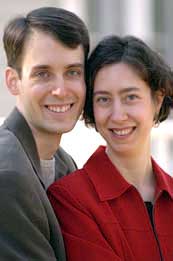-
- State lawmakers back off judge’s impeachment over lesbian custody case
- Some straight couples choose domestic partnership over marriage
- Mass. clerks have tradition of ignoring marriage eligibility rules
- ‘Queer As Folk’ back with marriage in mind
- Activists upset over conservative group’s spot on adoption panel
- Californians more liberal on marriage
- Veteran denied transplant, files complaint
- National News Briefs
- World News Briefs
national
Some straight couples choose domestic partnership over marriage
Getting married ‘like eating at a segregated lunch counter’
Published Thursday, 06-May-2004 in issue 854
CHICAGO (AP) – As same-sex couples fight for their right to marry, some straight couples – who could marry if they wanted to – are deciding against it. Instead, they’re registering as domestic partners, an option offered by some cities and counties, mainly with gay and lesbian couples in mind.
National statistics aren’t available, since some municipalities don’t track domestic partners’ gender or make their registries public. But experts are noting early signs that, while the marriage rate continues to decline, these alternative arrangements are piquing some straight couples’ interest.
Some heterosexuals, following a trend already popular in such countries as Sweden and France, choose domestic partnership for practical reasons.
Christopher Price and Bonnie Fletcher, both 25, did so in New York City last fall so they could qualify for student housing for couples at Mount Sinai School of Medicine, where they are graduate students.
Not ready to marry, Price calls their decision “a good, first, small step.”
“The first thing you do is you move in. The next thing you do is get a dog,” he says, chuckling. “And then you’ll find out who’s responsible or not.”
Others are making a political statement – as a show of support for same-sex couples who don’t have the same option. And some groups, led by heterosexuals, are even calling for a “marriage boycott” to protest a proposed constitutional amendment defining the institution as between a woman and a man.
“I just don’t think the state should be in the position of sanctioning who should be a family and who shouldn’t,” says Jennifer Gaboury, another New Yorker.
She and Jacob Goldfinger, both 33, registered as domestic partners last year and, instead of having a wedding, invited family and friends to their “commitzvah.” The ceremony included the traditional Jewish breaking of the glass after they exchanged vows. But there was no minister or justice of the peace – and no marriage license.
Gaboury says she arrived at her decision not to marry in college, after realizing that a lesbian friend couldn’t do so. Goldfinger grew to share her views. He says getting married “would have been like eating at a segregated lunch counter.”
Those calling for a marriage boycott applaud the decision, even if dissuading couples from legally tying the knot is difficult.
So far, Phoebe Rosenberg Jones – a straight, single, 26-year-old from Los Angeles, who recently posted the site Boycott-marriage.com – says she’s persuaded one couple to postpone their wedding and has others considering it. “I would just like to get more straight people engaged in the issue – no pun intended,” says Rosenberg Jones, whose opposition to a constitutional amendment inspired her to act.
Dorian Solot says she’s also heard from several couples that are boycotting marriage. She’s executive director of the Alternatives to Marriage Project, a nonprofit that provides information and support to couples who don’t wish to marry – and that posted its own boycott page last month.
“It becomes clearer every day that when it comes to relationships and families, there’s no one size that fits all,” says Solot, who is registered as a domestic partner with her longtime companion, Marshall Miller. They live in Albany, N.Y., and recently celebrated, as Solot calls it, their 11th “unmarried anniversary.”
Frank Furstenberg, a sociologist at the University of Pennsylvania, says it’s not surprising that some couples – especially young ones – are shunning marriage “as a sign of solidarity” with their lesbian and gay peers. In fact, he wonders if pushing the “one man, one woman” definition might only further the trend.
“We are genuinely running the risk of making marriage uncool,” says Furstenberg, a senior research scholar at the Council on Contemporary Families.
But David Popenoe, a sociologist who tracks marriage trends, calls the idea of a marriage boycott “idiotic.”
As co-director of the National Marriage Project at Rutgers University, he argues that the focus should be on creating more stable and committed relationships – gay or straight.
“My concern about that is children. The less stable the relationship, the worse it is for children,” he says. Choosing domestic partnership over marriage, he contends, often “represents a decline in commitment.”
Marion Willetts – a sociologist at Illinois State University who has surveyed straight domestic partners – argues that that’s not always the case.
But she says couples that choose domestic partnership need to do more to define their relationships legally. She found, for instance, that those she surveyed had done little to prepare for the death of a partner or a potential break up.
“It concerned me,” she says. “There wasn’t a lot of planning for the future.”
|
|
Copyright © 2003-2025 Uptown Publications


